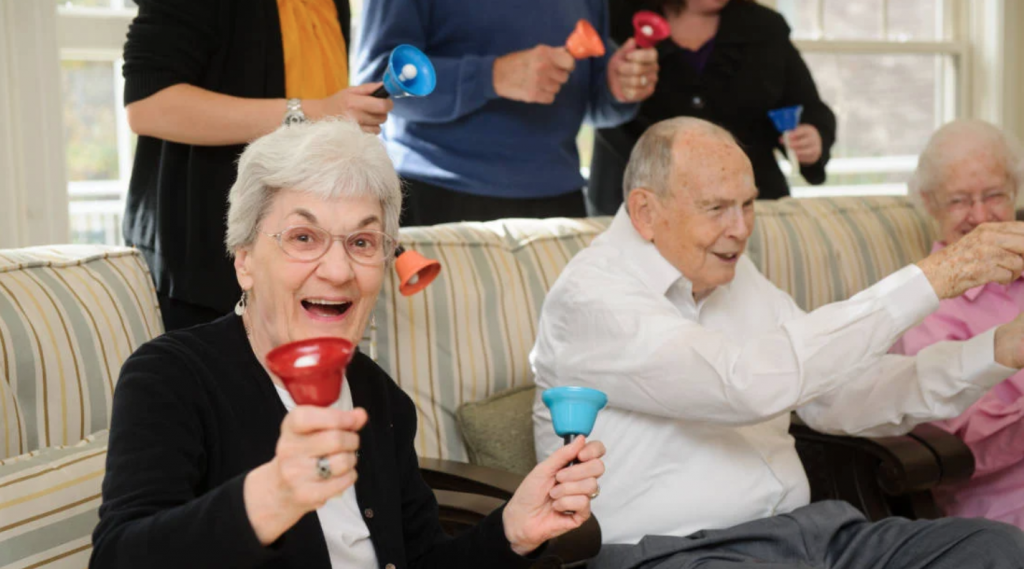“Music imprints itself in the brain deeper than any other human experience.Music evokes emotion and emotion can bring memory. Music brings back the feeling of life when nothing else can.”
…Dr. Oliver Sacks

Think back over the years… hasn’t there always been a song or two that speaks to you in every part of life? That sensation doesn’t go away as we age. In fact, it actually grows.
It may come as a surprise for many to learn that both playing and listening to music have been shown to positively affect quality of life for seniors.
Simply put: Music is powerful “medicine.” It holds the power to reduce stress, improve symptoms of depression, and enhance productivity, among others—and, ultimately, improve a person’s quality of life.
Music plays an important role in life for people of all ages. But for seniors, the benefits are even greater.
One of the most significant benefits of music for seniors is its seemingly magical ability to improve memory. Specifically, music can stimulate feelings of wellbeing in seniors by evoking strong memories and emotions.
For seniors who have age-related memory issues or even dementia, music has the power to actually bring back memories. In addition, music can help slow age-related cognitive decline by improving ageing adults’ cognitive processing speed
Music can elicit emotions and memories and help provide a link to a person’s past and promote interconnection with caregivers and others with dementia (for example). Over the last 25 years studies have suggested that that musical training delays cognitive decline and promotes brain plasticity in the elderly brain.
Music appears to be a unique and powerful stimulus
for reaffirming personal identity and social connectedness in individuals with dementia
Music and Dementia:
- Listening to familiar music can elicit pleasurable responses such as smiling or moving/dancing even when communication is lost.
- Singing has also been shown to improve behaviour, mood, and cognitive function in some dementia cases.
- From a physiological standpoint, music can also increase the heart rate and hormone levels in cognitively impaired patients.
- Furthermore, playing a musical instrument can delay the onset of future cognitive decline and reduce the risk of dementia.
- Thus, music appears to be a necessity for dementia patients.
Music is embedded in the fabric of human culture and identity. We have all been exposed to music in some way, whether by listening to your favourite songs, playing an instrument, attending concerts, or dancing. It provides a unique emotional experience that takes on personal and social meaning in endless respects.
Procedural Memory (PM)
Despite the level of brain impairment and severity in dementia, certain activities remain preserved in most instances and are very resistant to decline. These include activities such as pedaling an indoor bicycle, enjoying music, dancing, and throwing a baseball. The person doing these activities may not know who you are or who they are, but these activities were learned and engrained in their younger years and remain. The memory for these activities is called Procedural Memory (PM).
Agitation
Agitation is one of the most common behavioral concerns in dementia and present in more than 50 percent of cases.
There are at least three subtypes of agitation that occur in Dementia:
1. Physically nonaggressive behavior such as wandering.
2. Physically aggressive behavior such as hitting and kicking.
3. Verbal vocal agitation such as shouting, repeating words and demanding attention.
This agitation, regardless of type, leads to caregiver distress and predicts nursing home placement and greater use of restraints and psychotropic drugs, causing increased cognitive decline, stroke and death. This has triggered the important need for non-pharmacologic therapies, such as music to manage agitation. It is important to know that music can help agitation
When it comes to quality of life for seniors, some may not consider the important role that socialisation plays. Remaining socially active has been linked to a number of health benefits and remaining in good health is important for quality of life for seniors.
For seniors who are struggling with loneliness or looking to improve their social life, music may be just the ticket.
In many cases, music can broaden seniors’ social networks. Joining in with others to make and/or listen to music can spark discussions that improve connections with both friends and family members.
- Music can support the retention of speech and language skills
- It also offers a non-verbal, creative means of expression
- The stimulating effect of music encourages alertness, enabling greater motivation to communicate and connect with others
- The flexibility of music enables different levels of participation, and offers opportunities for the musical experience to be person- centred
- Memories of songs are linked to a person’s identity – their personal and cultural identity, history and life events
- Music can support memory recall, and the ability to appreciate and engage with music remains intact even as cognitive functions deteriorate
- Musical engagement offers a way to keep in touch with and explore one’s own creativity, opening up new or unfamiliar ways for self-expression and communication that do not rely on the use of words
- Music can offer and provide new experiences, hearing unfamiliar music, playing an instrument, singing with others in a choir for the first time. Music is more than just the golden oldies tunes
The above article has been put together using the sources that I share links to below. Please go and look at these articles for the full details
https://seniorlifepa.com/blog/turn-up-the-music-how-music-impacts-quality-of-life-for-seniors
https://practicalneurology.com/articles/2017-june/music-and-dementia-an-overview